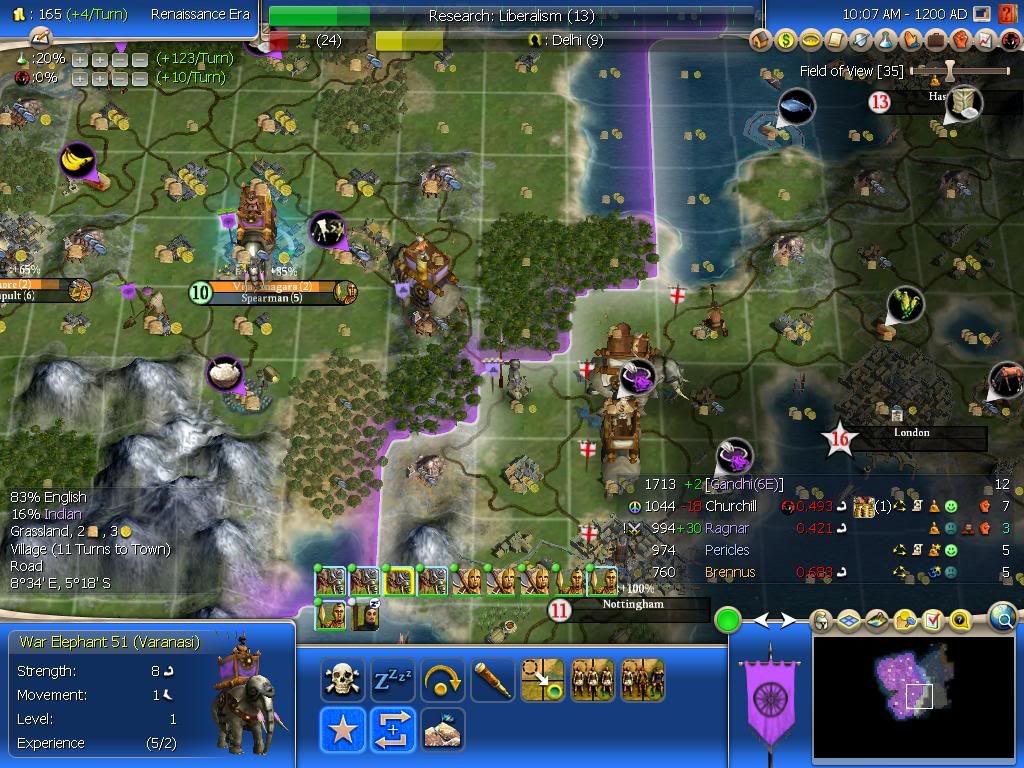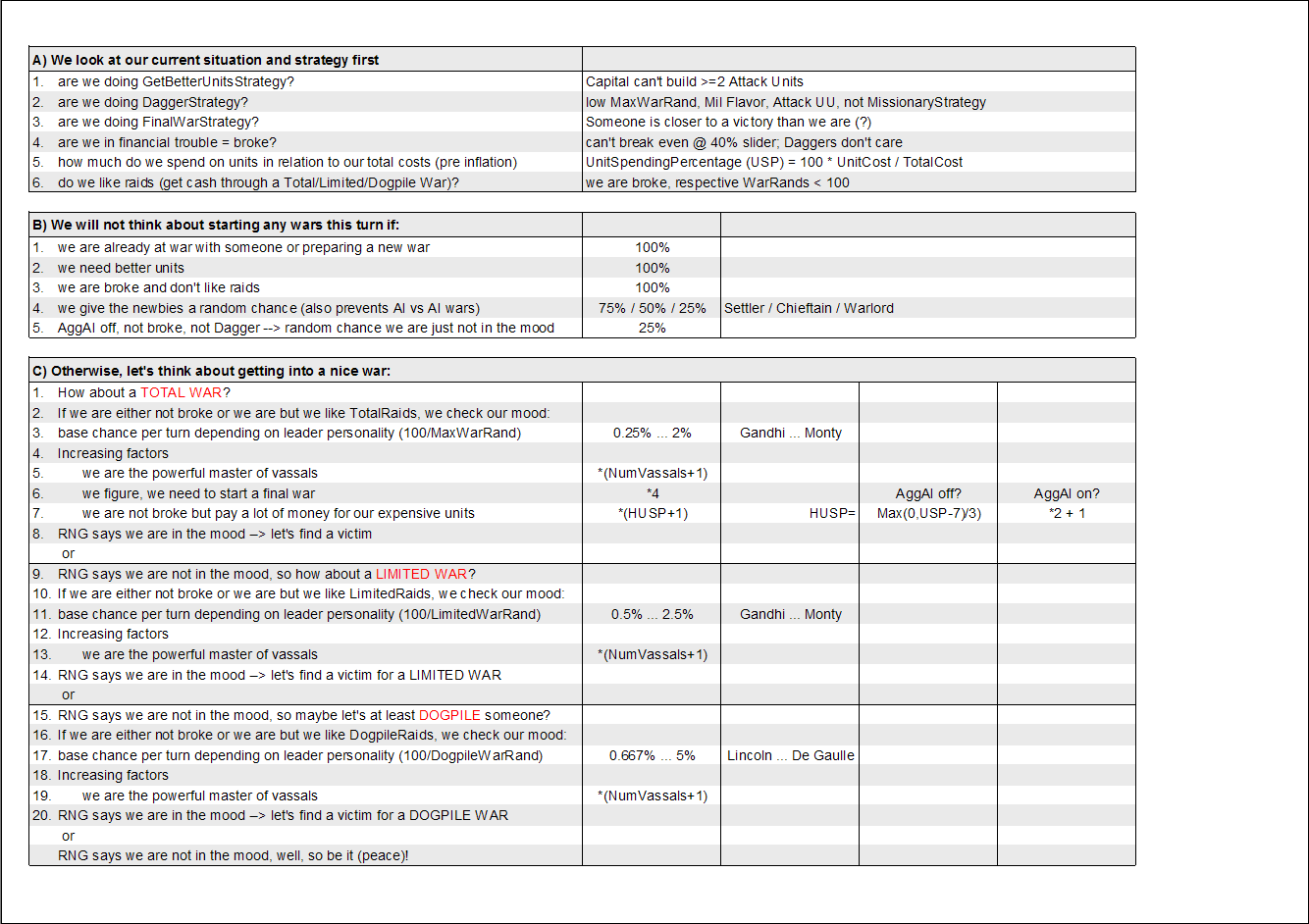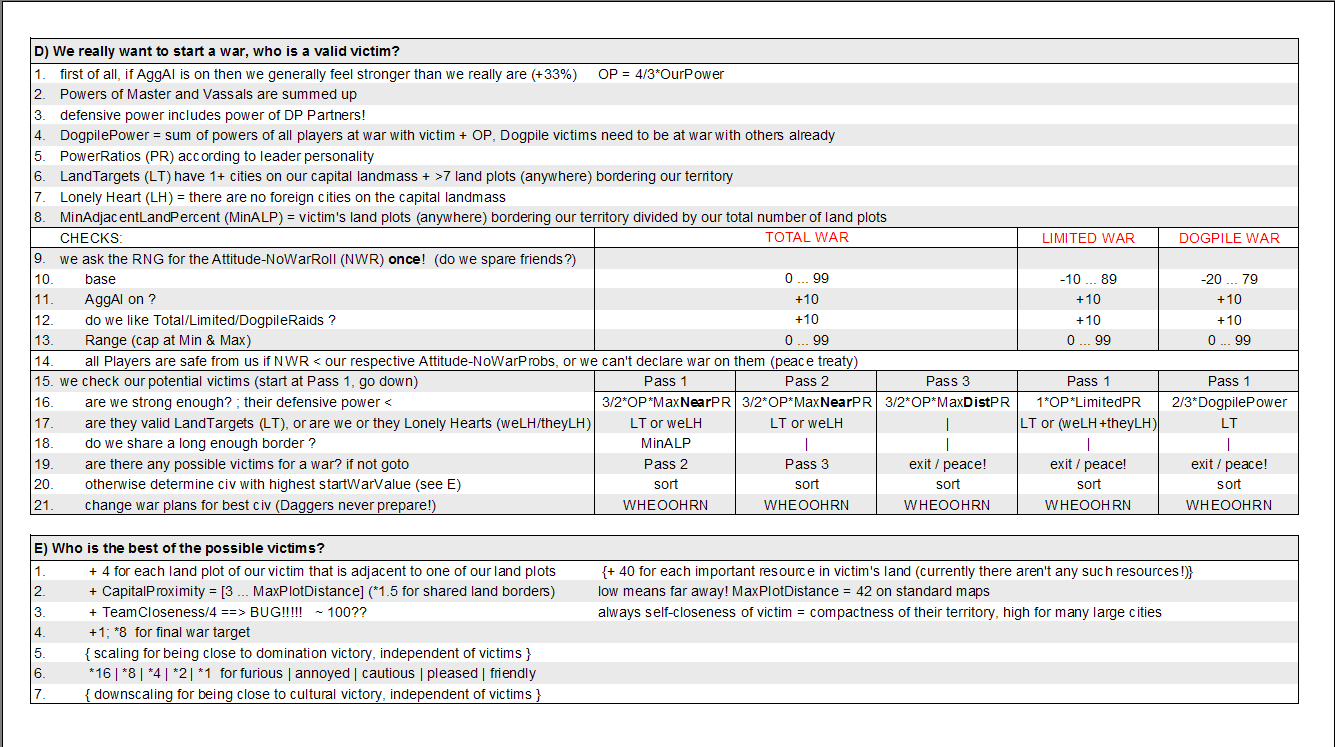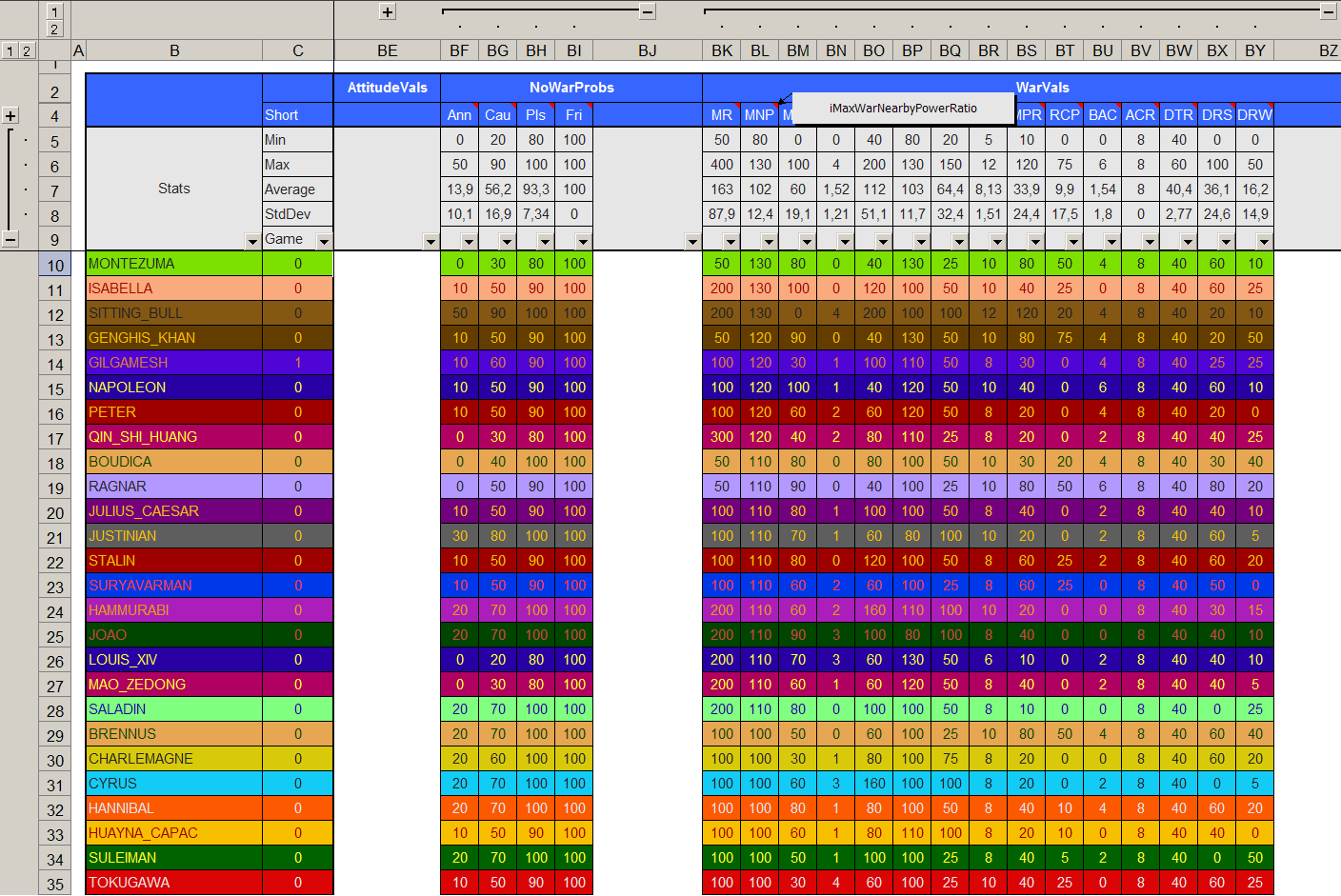Ok it appears I was wrong about Mahatma--he can never be a Dagger/doDaggerStrategy (btw what is really meant by that?), no matter where Delhi is located on the map.
He just lacks the necessary features (high MaxWarRand, high flavor values for military, Attack UU) and often does MissionaryStrategy which excludes Dagger.
I've taken a closer look at AI_doWar and most of the relevant functions that are called there and tried to put the main checks and criteria for the AI's war planning into comprehensible(?) words (MSExcel). Some of them differ quite a lot from the descriptions in Niklas' post. For simplicity I've neglected the concept of several players forming one team (so 1 player = 1 team, note: Vassals do not join the Master's team, they will still be two separate teams with 1 player each).
The AI's current strategy and financial situation is pretty important for the likelihood of DoWs. Especially the fact that the AI will not even start thinking about any wars when it is following the GetBetterUnitsStrategy might be responsible for the much earlier DoWs on Deity compared to the lower difficulties. The AI needs to be able to build at least 2 offensive units (UNITAIs ATTACK_CITY, COUNTER, RESERVE and PILLAGE) in its capital. Units of the types Axeman, Spearman, Chariot qualify here (basically everything better than Warriors and Archers), so once it manages to hook up the necessary strategic resources it will drop that strategy and start rolling the dice. With the 2 starting settlers and discounts for training more plus the fast teching I think Deities will reach that point 1000 yrs earlier.
The other interesting factors are how Vassals and the financial situation affect the probabilities for wars. I don't really know what to think of the HUSP-factor (HighUnitSpendingPercentage). For boxed in unit spammers this should be huge (compact empire = low total expenses). E.g. checking the 990AD save of Sisiutil's ALC24 shows Mehmed with USP = 12

/57

= 24% (HUSP = (USP-7)/3 = 5) and 2-city-Pacal with 2

/4

= 50% (HUSP = 14) (note: foreign trade is not taken into account!). So they should consider a total war 6 / 15 times as often, but Pacal's power is probably much to low to actually find a valid victim.
It's also interesting how the raiders don't care about the attitude that much (NWR+10),
so Boudica will declare at pleased if she is in financial trouble! (Edit: no she won't due to the capping at 99 and her NoWarProb=100)
The take home message (see also Niklas): Power doesn't mean anything to prevent a DoW unless you are over the relevant threshold! Attitude is much more important. If you are a Lonely Heart your are completely safe from Dogpiles and only have to fear LimitedWars from other Lonely Hearts. Have rather short borders. Don't be too close to yourself.
There is a (minor) BUG in AI_doWar as it checks bFinancesProMaxWar for limited raids instead of bFinancesProLimitedWar. There is a MAJOR (well known) BUG in CvPlayerAI::AI_playerCloseness, where the code determines the closeness of the victim to itself instead of the war planning AI's closeness to the victim, so that compact empires with many large cities make the juciest targets (AI_startWarVal). But it also affects the AI's strategy in the beginning of the game (AI_getStrategyHash). After making the first contact with a neighbor the AI will experience a sudden increase of paranoia due to the super (self-)close neighbor and drop Strategy_Peace and might directly jump to Strategy_Dagger. Daggers don't care about their money when it comes to starting a war... They also skip the whole war preparing thing (which others might drop again, see Saladin in ALC24).
The BetterAI guys have created a fix but AFAIK there is no guarantee yet, that the correct version doesn't bring up other unwanted side effects. (There are so many hard coded "x += (condition)? y : z"s and "q *= iNonsense"s in CIV's code that you just never really know what's gonna come out after killing a silly bug!)
To conveniently check and sort the several Leaders according to their WarRands and NoWarProbs or PowerRatios I've put their XML-values into an additional xls spreadsheet coarsely sorted by category. Columns are grouped and expandable, there is a "Game" column where you can put numbers in to filter everything for a current game. Leaders have their BTS-Colors.
I hope I didn't make too many mistakes here, after all this whole war thing is a pretty complex mess.
Edit: some minor corrections:
A) 4. AI is in financial trouble when (Inflated Costs + foreign trade dificit) > 60% of (beakers per turn + taxes income + foreign trade surplus), threshold increases by additional +8% when aiming for cultural victory, +12% when at war or preparing one, +10% when researching Future Techs
D)11. the +10 for NWR also applies for Daggers when AggAI is off (beware of Daggers in financial trouble--not only will they not oppose wars when broke, they will also care less about friends)
E) 2. MaxPlotDist is 72 for Standard Maps (with cylindrical world wrap)



 /57
/57


 . So Izzy's safe and TMIT will be the target.
. So Izzy's safe and TMIT will be the target.
 Vassals also count for the power average, so beating out a vassal will only make vassaling the master harder ( because the power average will drop ... and simple averages are pretty sensitive to extreme values, so a weak vassal will have a disporpotionate influence in that average ). The best way most of the times is to focus on beating the master enough for the vassals to break free and then vassal them one by one starting by the master ( the ex-vassals most of the time will refuse to vassal directly becasue they fear their ex-master ) and then proceeding to vassal the ex-vassals starting by the strongest of them.
Vassals also count for the power average, so beating out a vassal will only make vassaling the master harder ( because the power average will drop ... and simple averages are pretty sensitive to extreme values, so a weak vassal will have a disporpotionate influence in that average ). The best way most of the times is to focus on beating the master enough for the vassals to break free and then vassal them one by one starting by the master ( the ex-vassals most of the time will refuse to vassal directly becasue they fear their ex-master ) and then proceeding to vassal the ex-vassals starting by the strongest of them.